A Rogue's Life
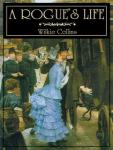
Frank Softly is a poor young gentleman whose snobbish father sends him to boarding school to make useful connections, but without success. He tries a variety of professions to earn his living but by the time he is twenty-five has failed at medicine, caricaturing, portrait painting, forging Old Masters and administering a scientific institution.
Frank then falls in love with Dr Dulcifer's daughter, Alicia, but discovers that her father is a counterfeit coin maker. Our likeable hero is unwillingly recruited into forging to compromise him as a felon. At this point the doctor considers him unsuitable as a son-in-law and sends Alicia away to Wales. The counterfeiters are betrayed to the Bow Street Runners but Frank escapes, finds Alicia and elopes with her to Scotland. Immediately after their wedding, Frank is arrested, tried and transported to Australia. As a model prisoner he becomes servant to his own wife who has travelled to the New World in the person of a widow. By the time Frank is officially released, their speculations have proved so successful that he is a rich man and a rogue no longer.
Related Books
-
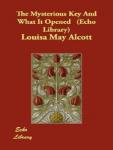 The Mysterious Key And What It OpenedLouisa May Alcott
The Mysterious Key And What It OpenedLouisa May Alcott -
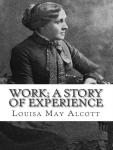 Work: A Stort Of ExperienceLouisa May Alcott
Work: A Stort Of ExperienceLouisa May Alcott -
 The Beasts of TarzanEdgar Rice Burroughs
The Beasts of TarzanEdgar Rice Burroughs -
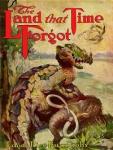 The Land That Time ForgotEdgar Rice Burroughs
The Land That Time ForgotEdgar Rice Burroughs -
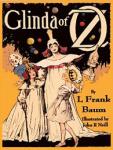 Glinda Of OzL. Frank Baum
Glinda Of OzL. Frank Baum -
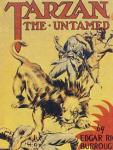 Tarzan the UntamedEdgar Rice Burroughs
Tarzan the UntamedEdgar Rice Burroughs -
 At the Earth's CoreEdgar Rice Burroughs
At the Earth's CoreEdgar Rice Burroughs -
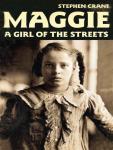 Maggie: A Girl of the StreetsStephen Crane
Maggie: A Girl of the StreetsStephen Crane
Author other works
-

The New Magdalen
Wilkie Collins
Mercy Merrick has been tricked into the tragic life of a woman of the streets, after a childhood with strolling players and gypsies. She struggles to rehabilitate herself, inspired by a sermon given by a young clergyman, Julian Gray, in the refuge where she was living. Working as a volunteer nurse in the Franco-German war of 1870, she meets Grace Roseberry, a penniless but well-connected and respectable young woman. When Grace is apparently killed by a German shell, Mercy assumes her identity. Armed with a letter of introduction to Grace's relation by marriage, Lady Janet Roy, she is helped to reach England by Horace Holmcroft, a war correspondent and acquaintance of Lady Roy. Mercy is warmly welcomed and becomes her companion and adopted daughter. With Lady Roy's approval, she becomes engaged to Horace.Grace is not dead, however, since her life has been saved by a German brain surgeon. She returns to England and is introduced to Lady Roy by Julian Gray, but lacking the evidence to back up her claim, is rejected as an imposter. Mercy is about to confess but is antagonised by Grace's vengeful, unforgiving nature. Grace is deemed insane and is about to be confined in an asylum when Mercy once more comes under the influence of Julian Gray, who falls in love with her, and she finally admits her deception. Horace breaks off their engagement while Grace accepts £500 as a bribe for her silence and leaves for Canada. Lady Roy, genuinely fond of Mercy, tries unsuccessfully to persuade her to remain as companion. At first Mercy refuses to marry Julian, in order not to ruin his career and social position. However, he becomes seriously ill and when he recovers Mercy finally agrees to marry him. Rejected by society, they sail to the New World to start life afresh.
-

Miss or Mrs?
Wilkie Collins
Natalie Graybrook is engaged to the much older Richard Turlington whom she detests but who needs her fortune of £40,000 to avoid bankruptcy. She is, however, in love with her cousin Launcelot Linzie. They marry secretly, though Natalie remains with her father Sir Joseph, to avoid a charge of abduction against Launcelot. Turlington, who is sole executor of Sir Joseph's will, learns of the secret marriage and arranges to have Sir Joseph murdered by an accomplice, Wildfang. The plot fails and Turlington is himself killed when his own revolver misfires.
-
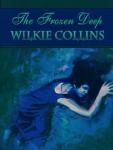
The Frozen Deep
Wilkie Collins
The Frozen Deep was a play, originally staged as an amateur theatrical, written by Wilkie Collins along with the substantial guidance of Charles Dickens in 1856. Dickens's hand was so prominent – beside acting in the play for several performances, he added a preface, altered lines, and attended to most of the props and sets – that the principal edition of the play is entitled "Under the Management of Charles Dickens". John C. Eckel wrote: "As usual with a play which passed into rehearsal under Dickens' auspices it came out improved. This was the case with The Frozen Deep. The changes were so numerous that the drama almost may be ascribed to Dickens". Dickens himself took the part of Richard Wardour and was stage-manager during its modest original staging in Dickens' home Tavistock House. The play, however, grew in influence through a series of outside performances, including one before Queen Victoria at the Royal Gallery of Illustration, and a three-performance run at the Manchester Free Trade Hall for the benefit of the Douglas Jerrold Fund to benefit the widow of Dickens's old friend Douglas Jerrold. There, night after night, everyone – including, by some accounts, the carpenters and the stage-hands – was moved to tears by the play. It also brought Dickens together with Ellen Ternan, an actress he hired to play one of the parts, and for whom he would leave his wife Catherine. The play remained unpublished until a private printing appeared sometime in 1866.
-

The Woman in White
Wilkie Collins
The Woman in White is an epistolary novel written by Wilkie Collins in 1859, serialized in 1859–1860, and first published in book form in 1860. It is considered to be among the first mystery novels and is widely regarded as one of the first (and finest) in the genre of 'sensation novels'.The story is considered an early example of detective fiction with the hero, Walter Hartright, employing many of the sleuthing techniques of later private detectives. The use of multiple narratives draws on Collins's legal training, and as he points out in his Preamble: 'the story here presented will be told by more than one pen, as the story of an offence against the laws is told in Court by more than one witness'. In 2003, Robert McCrum writing for The Observer listed The Woman in White number 23 in "the top 100 greatest novels of all time", and the novel was listed at number 77 on the BBC's survey The Big Read.Walter Hartright, a young art teacher, is walking from Hampstead to London late one summer's evening, when he meets a mysterious woman dressed in white, apparently in deep distress. He helps her on her way to London, but later learns that she has escaped from an asylum. The next day he travels north to Limmeridge House, having been hired as a drawing master to the residents of the house; he had been recommended for the job by his friend, Pesca, an Italian language professor. The Limmeridge household comprises Mr Frederick Fairlie, and Walter's students: Laura Fairlie, Mr Fairlie's niece, and Marian Halcombe, her devoted half-sister. Several days after he arrives, Hartright is shocked to realize that Laura bears an astonishing resemblance to the woman in white, called Anne Catherick. The mentally disadvantaged Anne had lived for a time in Cumberland as a child and was devoted to Laura's mother, who first dressed her in white.Walter and Laura quickly fall in love. Laura, however, has promised her father that she will marry Sir Percival Glyde, and Marian – knowing that Laura loves Walter in return – advises Walter to forget his love, and leave Limmeridge. Anne, after sending a letter to Laura warning her against Glyde, meets Hartright who becomes convinced that Glyde was responsible for shutting Anne in the asylum. Despite the misgivings of the Fairlie's lawyer over the financial terms of the marriage settlement, Laura and Glyde marry in December 1849 and travel to Italy for 6 months. Hartright also leaves England, joining an expedition to Honduras. After their honeymoon, Sir Percival and Lady Glyde return to his family estate, Blackwater Park, in Hampshire; they are accompanied by Glyde's friend, Count Fosco (who is married to Laura's aunt). Marian Halcombe is also living at Blackwater and learns that Glyde is in financial difficulties. Sir Percival unsuccessfully attempts to bully Laura into signing a document which would allow him to use her marriage settlement of £20,000. Determined to protect her sister, Marian crawls out onto a roof overlooking Percy and Fosco whilst they plot; but it begins to rain, and Marian, completely soaked, falls into a fever which shortly turns into typhus.While Marian is ill, Laura is tricked into travelling to London. Her identity and that of Anne Catherick are then switched. Anne Catherick dies of a heart condition and is buried in Cumberland as Laura, while Laura is drugged and placed in the asylum as Anne Catherick. When Marian recovers and visits the asylum, hoping to learn something from Anne Catherick, she finds Laura, supposedly suffering from the delusion that she is Lady Glyde.Marian bribes the nurse and Laura escapes. Hartright has safely returned from Honduras, and the three live together in obscure poverty, determined to restore Laura's identity. After some time Walter discovers Glyde's secret, which is that he was illegitimate, and therefore not entitled to inherit his parents' property. This secret was known only to Anne's mother, and while Anne never knew the secret, she spoke and acted as if she did. Many years earlier, Glyde had forged an entry in the marriage register at Old Welmingham Church to conceal his illegitimacy and hence unlawful inheritance of estate and title. Believing Walter either has discovered, or will discover his secret, Glyde attempts to destroy the register entry, but the church vestry catches fire and he perishes in the flames. Confronting Anne's mother, Hartright discovers that Anne was the illegitimate child of Laura's father, which accounts for their resemblance. On returning to London to resume his battle with Fosco, Hartright marries Laura. When he secretly tails Fosco to investigate him, Hartright also discovers that Fosco belongs to, and has betrayed, an Italian secret society (dubbed "The Brotherhood"), of which Pesca is a high-ranking member with enough authority to dispatch him. Using Fosco's weakness as bargaining chip, Hartright now has the power to force a written confession from Fosco and Laura's identity is restored. Fosco departs from England in haste, only to be discovered by the Brotherhood's agents some time later and murdered. Since Hartright and Laura have married, on the death of Frederick Fairlie, their son becomes the Heir of Limmeridge.
-

I Say No
Wilkie Collins
Emily Brown is an orphan girl that almost no one can help but love when they meet her. She is pursued by two worthy men: Mr. Alban Morris, the drawing master at her school; and Rev. Miles Mirabel, a clergyman. However, one of them is lying to her after she discovers that her father's death wasn't natural, as she was led to believe.